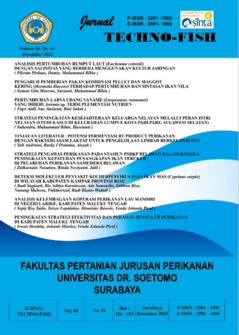Main Article Content
Abstract
The roles and responsibilities of women, both physically and mentally, are different from
those of men. The issue of women's participation in the public sphere has always been a hot topic
in various discussions, mainly because of the social inequality that still exists. These differences
arise from multiple factors, such as social structure, socialization processes, empowerment, and
social and cultural construction. Gender itself is socially formed, involving various behaviors and
expectations related to men and women. One of the main challenges Indonesian society faces
today is the role of women in the world of work. This study aims to analyze the level of family
income and formulate strategies to improve the welfare of fishing families in Lumpue Village. The
method used in this study is a case study with a qualitative and quantitative approach, where data
analysis is carried out using SWOT analysis. The study results show that internal factors have a
higher score of 2.3 than weaknesses, which only get a score of 0.2. On the external factor side,
threats from gender roles can be anticipated by opportunities, reflected in the opportunities score
of 2.25, while threats only get a score of 0.23. The role of women in coastal fisheries activities in
Bacukiki Barat District, especially in Lumpue Village, Pare-Pare City, is crucial for improving the
family economy. They contribute to fish marketing and play an essential role in adding value to
fishery products in this sector.
Article Details

This work is licensed under a Creative Commons Attribution-NonCommercial-NoDerivatives 4.0 International License.

This work is licensed under a Creative Commons Attribution-NonCommercial-ShareAlike 4.0 International License
References
- Azmy, S. (2020). Buku Data Terpilah Gender (Vol. 1).
- Chotimah, S. P. N., Oktafiah, Y., & Subagio, D. P. W. (2023). Strategi Pengembangan Usaha Krupuk Puli Melalui Analisis SWOT Desa Kalipang Kabupaten Pasuruan. Jurnal Manajemen Revenue, 1, 163–170.
- Huda, N., & Dahliana, D. (2024). Kesetaraan Gender pada Pengkaderan Ulama di UIN Antasari. Jurnal Pendidikan dan Studi Islam (Vol. 5). Retrieved from http://jurnal.staiddimakassar.ac.id/index.php/aujpsi
- Husuna, F., Sondakh, S. J., & Wasak, M. P. (2019). Peran Gender pada Peningkatan Kesejahteraan Keluarga Nelayan di Desa Bulawan Induk Kecamatan Kotabunan Kabupaten Bolaang Mongondow Timur. Jurnal Unsrat Akulasi, 7(14), 1343–1354.
- Martono, G. H., Azhari, A., & Mustofa, K. (2022). Strategi Peningkatan Pendapatan Keluarga Nelayan Melalui Peran Perempuan: Studi Kasus pada Komunitas Nelayan Demak, Jawa Tengah. International Journal of Advances in Intelligent Informatics, 8(1), 1–11. https://doi.org/10.26555/ijain.v8i1.800
- Nugraheni, R., Sayekti, S., & Sari, N. K. ANALYSIS OF MSMEs WOMEN’S ROLE STRATEGY IN ECONOMIC IMPROVEMENT IN NGANTANG (SWOT ANALYSIS APPROACH).
- Saruwaba, J. F., Manoppo, V. E. N., Olvie, K., Durand, S. S., Aling, D. R. R., & Tambani, G. O. (2023). Pendapatan Keluarga (Studi Kasus Di Wilayah Pesisir Desa Tateli Weru Kecamatan Mandolang Kabupaten Minahasa). Jurnal Ilmiah Agrobisnis Perikanan, 1(1), 91–100.
- Triarso, I. (2012). Potensi dan Peluang Pengembangan Usaha Perikanan Tangkap di Pantura Jawa tengah. Jurnal Saintek Perikanan, 8(1).
- Yanfika, H., Viantimala, B., Nurmayasari, I., & Mutolib, A. (2021). Kesetaraan Gender dan Strategi Nafkah untuk Penyusunan Program Penyuluhan pada Masyarakat Pesisir di Kabupaten Tanggamus, Provinsi Lampung. Jurnal Penyuluhan, 17(2), 126–135. https://doi.org/10.25015/17202133523
